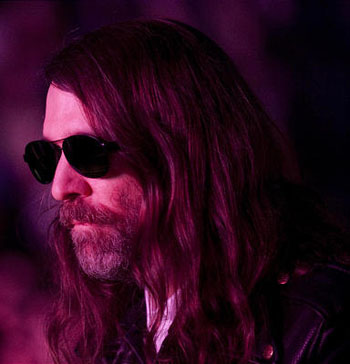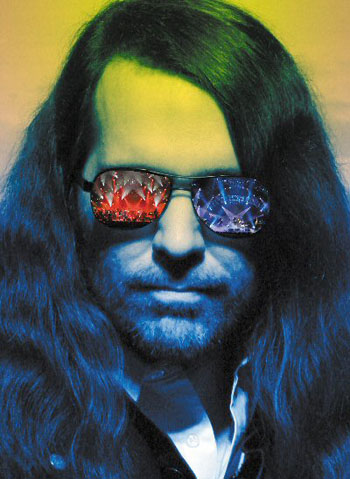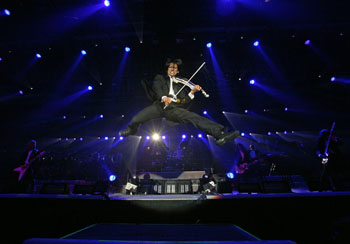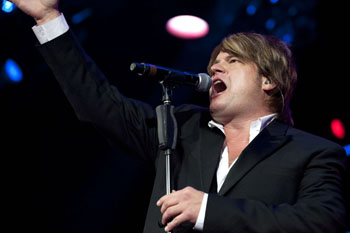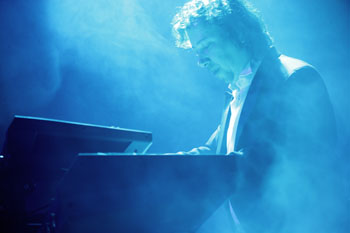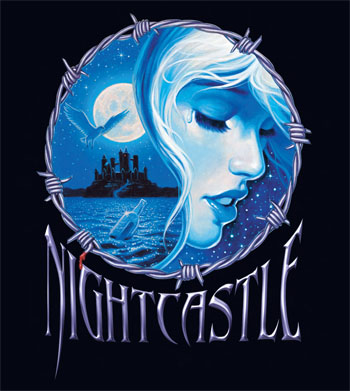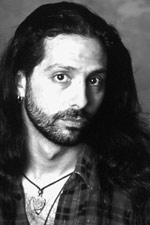
|
||
|
| Interview: TRANS-SIBERIAN ORCHESTRA | ||
Trans-Siberian Orchestra, or TSO, are a US phenomenon who are about to storm Europe on their first visit. In the USA they sell a million albums a year, and when they tour they sell 600,000 tickets a month. Impressive huh? And this orchestra are just that: an orchestra. Mixing hard rock, neoclassical rock and progressive rock, they are an orchestra of a rock band and that's before you add the actual orchestra, they record with 20 strings and 20 backing singers.
Their live shows (think 10 Pink Floyds playing with an
orchestra) are huge, and have been known to blow out the power
for an entire stadium (an in one case, the surrounding town
too).
Their new album Night Castle is typical TSO in that it is a rock
opera, with a lead singer taking on every role, and the 2 CD
comes in an impressive gatefold digipak with a 60 page book
(lyrics, story the works).
He is then captured and dies in captivity, but the Cambodian
general holding him realises the war is futile, and he vows to
escape and deliver the message and the lieutenant's stories to
the wife. The story ends with the man on the beech revealing he
is that general, saying he was not brave enough to finish the
journey, and of the bravery of the girl to approach and talk to
the stranger.
Joe: Can you tell us about the lyrical concept of the new album?
The girl and the Cambodian soldier. Going back to the early 90s Ahmet Ertegun (Atlantic boss) called me and said "Paul:, you've worked with all these other bands, how about you do your own" and I said OK but it would be pretty different. He asked what does that mean and I replied that it would be a progressive rock band with a full rock band so you'd have 2 drummers, orchestra, 24 lead singers, in the studio and on the road. Why? Well, I want to do mini rock operas. I wanted to do six. Maybe one day we'll do a regular record but at the moment it's rock operas. And what we do is, like with Night Castle, after the rock opera is over we have a bunch of songs so we put them on as a bonus, and we use them to pay tribute to the people who have influenced us, may be to showcase or try out some things we have coming up in the future. But when I told them all of this they kind of rolled their eyes, but they wrote a blank cheque. But the first rock opera was about communism and the revolution and it was the 90s with the Berlin wall coming down and some very credible people heard it and said this is too good to go on an album, this has to go to Broadway.
But I fought for creative control and what Broadway considers a
credible production we consider, well I consider... and you
can't do that on Broadway. Our first stage production will
probably happen in Vegas which has the stages and the power. We were playing in Jackson Mississippi and we're hooking up the generators they say "We're a state of the art building, we can handle anything" and we thing great, less work for us. And 15 minutes into the show, stage goes dark, and I go "I know, just blew the circuit breaker for the building" and they say "Paul, no, you just blew the breaker for half of Jackson", not the whole city just part of it. The show's massive, and over the years it's gotten bigger and bigger. It's by far the biggest, most complicated tour production ever. In 2009 we played the stadium in Baltimore and we had to leave about a third of it in the truck. So I said to our tour manager let's just skip Baltimore this year as we can't fit in the arena. And he says, when you tell me to skip this small city in Idaho, I can deal with that, but when you can't fit into Baltimore... My biggest regret with TSO is that it's taken so long to get it together (for Europe), because we're so Euro centric as part of our influences.
Joe: So this stage show, is that why it's taken so long to come
over? Truth is I didn't have on my radar what I saw with TSO, you know the complete meltdown of the record industry, and with most of the western civilisation committing financial suicide and it didn't help when I heard that Madonna's rig had collapsed in France and killed some people. Her show isn't a 20th of what ours is, and in America I really know my vendors and if one of them has so many tours cancelled then tell me and I'll write them a cheque because it's important that all the spot welds are x-rayed and everything. I love what we do, I love the look on the face of the audience at the show, but it's not worth it if a single person gets hurt. And I'm very aware that, when things started, we've been touring there for 12 years selling 600,000 tickets a month, but we had to do what we did; tour and tour and tour. But you bring up an interesting point, in America, and Canada, hockey and basketball are like national sports, and American Football too, so every city, no matter how small, has a great coliseum.
Here it is more soccer oriented so there's only 10 or 15
buildings that can hold a TSO show, where we're hanging 120
tonnes of lights, the lights move in time to the music, the
pyros go off in time to the music. A tonne that is hanging there
is a tonne. Once it starts to move it weighs less than a tonne,
when it starts to stop it can way... Sometimes bands take it for granted, they think it's the fans' privilege but it's not, it's our privilege, otherwise we'd have to go get real jobs. And it's not every year, you have to earn it every night, every album. And I think that TSO is incredibly lucky in a lot of ways. The first album came out in 1996, and when you think about Pink Floyd, Yes or Genesis had old fashioned artist development. The first album didn't sell well but the label said we're onto something.
Joe: Yes, Pink Floyd changed style considerably before they made
it, Genesis' first album flopped. By 2009, there's only 4, well 4 big ones, then in 2010 EMI went bankrupt, now it's only 3. So unless your Dad's David Rockefeller, you know, because the labels don't build a solid tour foundation. We're one of the last bands to have old fashioned artist development from the labels. Especially from Ahmet Ertegun, when you consider who he's worked with. If TSO had come out in 2006, instead of 1996, we would have been dropped. When I started in the business, in the 70s, you were considered a stadium rock band if you could sell out stadiums for 5 years in a row, and nobody has done that in the new millennium. It's not lack of talent on the band's behalf, it's lack of support in the labels' behalf. The support to help you get to that level doesn't exist anymore. On the Night Castle album, even though we have 24 lead singers, when I wrote the story you had the two main adversaries, Lieutenant and General Trans Do, and the guy singing General Do's part, Rob Evan, tremendous voice, and the guy we had singing the Lieutenant's part was just getting steamrollered. I like to have voices that match the parts. I kept trying people, and then turned to Al Pitrelli who suggested Jeff Scott Soto, who'd been in Yngwie Malmsteen's band, now in Journey, and said "Al, that's too high, the Lieutenant is a baritone" and Al said "Jeff is a baritone". Oh. So we flew him in and it was like two battleships going at it. The band is allowed to breath, it's musically driven, and it's great with Jeff's experience. We've recently had some female backing singers join us and two of them were born in 1992 and one of them, her octave range is amazing, and this girl who sounds like Janis Joplin was born in 1993, it's really weird, I'm forming the band and she's busy being born (laughs).
The majority of the band are 25 to 45, there's a couple in their
50s. It's bad enough being old enough to be their parents, but
grandparents?
It's like pulling up the drawbridge to the castle, depending on
your age or your mood, it's where you want to go, the highest
tower or whatever. I learnt that from The Who, the album Who's
Next, my favourite track from that album changes as I've gotten
older. So we try to design every concert and every album so that
you find what you need to find. And the more you explore it, the
more there is to find.
Because in the end, god isn't just going to save Lutherans, not
just Christians, but god is going to save Satan. Now that is an
all powerful heavy metal god. I think that anyone who says kill
those who don't believe, they have nothing to do with god. For
either for all or for no-one. It's like, my hero is Winston
Churchill, in the world war, 1939, Churchill didn't fight for
Great Briton, he didn't fight for the allies, Churchill was
fighting as much for Germany, who were under Hitler and Himmler,
and the Japanese having to live under Tojo, Churchill was
fighting for everybody. To me, the first great civilisation were the Greeks, they were the first to say the Universe doesn't work by magic, it works by a set of rules and they then figured out those rules. And although Mesopotamia and Egypt were great civilisations, millennia before Greece, the word freedom didn't exist, they invented it. They came up with Pi out of nowhere, basis of science and mathematical rules. But then Winston Churchill said civilisation isn't an accident, it takes a turn of vigilance, but what it takes 1000 generations to build, a single generation can lose. And I think civilisation is at its most danger after long periods of peace, it gets complacent. And there's a lot to be said for trust, when people don't trust each other. Stalin killed 36 million of his own people, an amazing number. His soldiers were killing in the Ukraine because they weren't turning over their farms and his right hand man said to him, be careful, the West will turn against us, and he didn't look up from his desk, he just said "Bury it. A single death is a tragedy, a million deaths is a statistic". And he's right. Was it 36 million people? It may have been 50 million people. Pol Pot killed millions of children, and Cambodia is not a big country, but he died on his bed surrounded by his family and people from the UN. People stand by and do nothing. It's appeasement, which just makes the evil think it's ok to carry on. It makes me realise I've got to keep my eye on the ball, not let people down.
So my tour manager says Paul: you got allow the band to breath,
you design it for the album, you might need to do it the
production so you don't have to bypass minor cities like Berlin.
OK OK got the point (laughs) so we're designing it to breathe,
this is going to be the first run and we've realised we've got
to work hard, because work on the other side of the pond doesn't
count over here.
Of those, only about 50 made real money, enough money to recoup all the other mistakes. If you're a rock band, they expect you to tour, and by tour I mean 11 months on, 1 month off, 11 months on, 1 month off, then another album back in the studio. I have a friend who had an operation to remove nodes from his vocal chords, and the chords are only this thick, they're not designed to sing for 2 hours a night, 5 nights a week. Look at Arnold Schwarzenegger at 19, works out for 2 hours a day for 5 days a week and gets calluses on his hands. With TSO, we try to give the best possible concerts for the best possible price, but on the other hand, do no harm, especially to the lead singers. Since we have so many lead singers, no singer has to sing more than 4or 5 songs a night. Now that you can do, it's more like a party.
Joe: Going back to the recording, it's a far cry from the early
70s when bands regularly put out 3 albums in 2 years and toured
as well. And one thing you get with our albums is the packaging, with the story. You explain to some people an album's concept and it's like huh? So what I do is write out the prose, it goes with the album, and I've turned some of it into poetry for some of our concerts, with a narrator, so if someone who knows the concept takes his girlfriend he's not got to explain it all over. You can follow it all the way through. And what we do is, no disrespect to bands like The Who when they do a rock opera, our show is the rock opera, then some of our other songs as a bonus. And we do all that we can to make each song cut deeper, more emotionally. We spent over $100k cutting one song and then I realised if you change the key by half a step, make it 0.1% better, it goes in the garbage, because I want that extra 0.1%. Back in 2005, we were one of the top touring bands in the world, and a friend of mine who's a numbers nut did a breakdown of our audience, and the average age was 21. It's like all the 15 year olds cancel out the 40 year olds. There's a great schism in music, back in 1950 when Les Paul invents the electric guitar. Before then you grew up with the orchestrated music or after that with Chuck Berry. It's now 60 years later, in the 50s you had Chuck Berry, in the 60s you had the Beatles, Rolling Stones, in the 70s you had Led Zeppelin, Temptations, Earth Wind & Fire, so for the first time, unless you're like 80, everyone has some kind of rock in common. We get a lot of fan mail and it tends to be two extremes, either "My 15 year old son dragged me to one of your shows kicking and screaming" or "My dad dragged me along", and it's such a great feeling to jump the generational wall. And on Night Castle it's the same. We recorded "Nut Rocker" with Greg Lake, and so it's TSO paying tribute to ELP paying tribute to Tchaikovsky. And we recorded "Carmina Burana" because that's one of the first songs that really woke me up to the power of music.
I first heard it in the 70s, and in the 80s I was at an Ozzy
Osbourne show and the show starts with "Carmina Burana" and the
crowd go nuts, and then in the 90s a friend of mine takes me to
a rap show and before they take the stage the tape goes on and
it's "Carmina Burana", and the crowd goes nuts. It's written by
a monk in the middle ages, composed by a classical composer in
the 1930, It's been around for centuries, the lyrics are Latin;
I'll bet a lot of money that 99% of that audience at Ozzy
Osbourne didn't know any Latin. The internet has changed a lot. In 1995 the music industry was easily worth over a trillion dollars. Now you could probably buy every record company, every publishing company, for $10 Billion. That's 1% of what it was worth 15 years ago. The meltdown happened so fast. I recently saw that my daughter has every song I'd ever written, ever produced, on her computer. I say 'Honey, where did you get all of this' and she says 'Daddy, you're not going to believe this, but all of your music is on the internet. For free' and I'm like Wow. And shortly after that there was an article in the Wall Street Journal - it's not a music paper, it's financial - and it explained what was going on, that the labels were sticking their heads in the sand and hoping it was going to go away. So it was a case of do you make your money through your record player or by touring. And on one hand technology giveth and on the other hand it taketh away, and ouch I didn't want to hear that. But technology can also open doors, like with our light show we have over 3000 light changes, impossible without computers.
Joe: But on the other hand, with downloads, you don't get this
wonderful packaging (holding up new TSO album, 2CD, gatefold
digipak, 60 page booklet) But with this technology, streaming is becoming more efficient and it's bankrupting the industry.
Night Castle cost a couple of million dollars to make, and it's something someone in Nigeria can download for free. Something's going to have to happen. It's like in Finland they did away with copyright, then someone said Wow it's been years since anyone wrote anything in Finnish, does that have anything to do with it well possibly, so they bought it back.
We're living in rapidly changing times. It's going to be
interesting to see how things go in the next few years. But in
the meantime we have this tour, we're back in New York next week
to see how it's going to go, work out who's going to be in the
band. It's going to be an adventure, it's been a strange
journey. Couldn't have imagined it in a million years.
The label asked me once what is a prog rock band and I said it's
the ultimate form of music. If you're a jazz band and you play
reggae, you're not a jazz band any more, if you're a reggae band
and you play a waltz, you're not a reggae band any more. Prog
rock doesn't have those limits, it's progressive, it's what it's
all about.
New York City used to have 100 studios, each with 5 rooms, the older generation could mix with the young. Now with ProTools, for $5000 you could rent a better studio than the Beatles ever had.
ProTools is great for tidying things up, but it won't help you
write a better song. And also, now, with the drinking limit
being 21, the whole club scene died. The way club bands used to
break it in America is you'd be a cover band, then at the end of
the night you'd do a couple of originals.
Al Pitrelli has played with everyone from Alice Cooper to Megadeth...and has been with TSO since the start after working with Paul O'Neill in Savatage.
So I bought a new car, and in it there was this subscription radio, which is commercial free, and has 200 stations you can pick up anywhere in America. There's a rock one, a metal one, a country station and so on.
And I happened across Top 40, this
channel that just plays the new stuff, and I've been stuck on
that ever since. I love new music, Alicia Keys, Eminem, Katy
Perry, anything new. Our audiences range from 7 to 77, why
should I grow up. It's all the same 12 notes, from Beethoven to
Black Sabbath.
I love that old Motown stuff, Mike McDonald has done a Motown
covers album, Rod Stewart did his American Songbook which is
older stuff. I grew up in New York when the Vietnam War was
going on and the protest songs, it was a different world then,
you knew where you were when a certain song was on radio.
Interview © February
2011 Joe: Geesin |
|
get ready to rock is a division of hotdigitsnewmedia group

